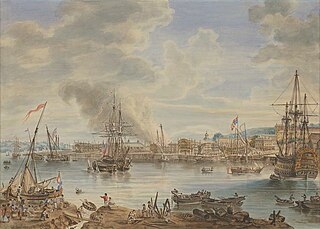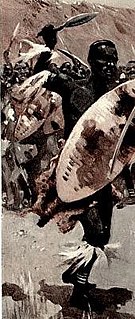
Impi is a Zulu word for any armed body of men. However, in English it is often used to refer to a Zulu regiment, which is called an ibutho in Zulu. Its beginnings lie far back in historic tribal warfare customs, when groups of armed men called impis battled. They were systematised radically by the Zulu king Shaka, who was then only the exiled illegitimate son of king Senzangakhona, but already showing much prowess as a general in the army of Mthethwa king Dingiswayo in the Mthethwa-Ndwandwe war in the early 1810s.

In the history of the United Kingdom, the Victorian era was the period of Queen Victoria's reign, from 20 June 1837 until her death on 22 January 1901. The era followed the Georgian period and preceded the Edwardian period, and its later half overlaps with the first part of the Belle Époque era of Continental Europe. In terms of moral sensibilities and political reforms, this period began with the passage of the Reform Act 1832. There was a strong religious drive for higher moral standards led by the nonconformist churches, such as the Methodist, and the Evangelical wing of the established Church of England. Britain's relations with the other Great Powers were driven by the colonial antagonism of the Great Game with Russia, climaxing during the Crimean War; a Pax Britannica of international free trade was maintained by the country's naval and industrial supremacy. Britain embarked on global imperial expansion, particularly in Asia and Africa, which made the British Empire the largest empire in history. National self-confidence peaked.

The Second Boer War was fought between the British Empire and two Boer states, the South African Republic and the Orange Free State, over the Empire's influence in South Africa. It is also known variously as the Boer War, Anglo-Boer War, or South African War. Initial Boer attacks were successful, and although British reinforcements later reversed these, the war continued for years with Boer guerrilla warfare, until harsh British counter-measures brought them to terms.

The first humans are believed to have inhabited South Africa more than 100,000 years ago. The historical record of this ethnically diverse country is generally divided into five distinct periods: the pre-colonial era, the colonial era, the post-colonial and apartheid eras, and the post-apartheid era. Much of this history, particularly of the colonial and post-colonial eras, is characterised by clashes of culture, violent territorial disputes between European settlers and indigenous people, dispossession and repression, and other racial and political tensions.

The Edwardian era or Edwardian period of British history covers the brief reign of King Edward VII, 1901 to 1910, and is sometimes extended in both directions to capture long-term trends from the 1890s to the First World War. The death of Queen Victoria in January 1901 marked the end of the Victorian era. Her son and successor, Edward VII, was already the leader of a fashionable elite that set a style influenced by the art and fashions of continental Europe. Samuel Hynes described the Edwardian era as a "leisurely time when women wore picture hats and did not vote, when the rich were not ashamed to live conspicuously, and the sun really never set on the British flag."
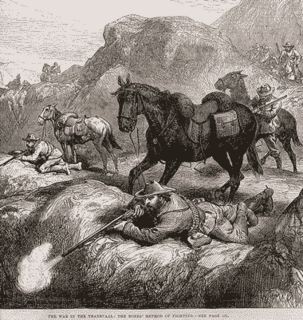
The First Boer War, also known as the First Anglo-Boer War, the Transvaal War or the Transvaal Rebellion, was a war fought from 16 December 1880 until 23 March 1881 between the United Kingdom and the South African Republic. The war resulted in defeat for the British and the second independence of the South African Republic.
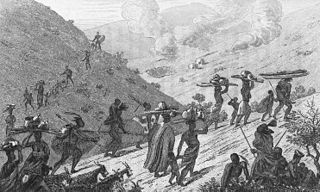
Mfecane, also known by the Sesotho name Difaqane or Lifaqane, was a period of widespread chaos and warfare among indigenous ethnic communities in southern Africa during the period between 1815 and about 1840.

Moshoeshoe was born at Menkhoaneng in the northern part of present-day Lesotho. He was the first son of Mokhachane, a minor chief of the Bamokoteli lineage- a branch of the Koena (crocodile) clan. In his early childhood, he helped his father gain power over some other smaller clans. At the age of 34 Moshoeshoe formed his own clan and became a chief. He and his followers settled at the Butha-Buthe Mountain.

The Battle of Isandlwana on 22 January 1879 was the first major encounter in the Anglo–Zulu War between the British Empire and the Zulu Kingdom. Eleven days after the British commenced their invasion of Zululand in South Africa, a Zulu force of some 20,000 warriors attacked a portion of the British main column consisting of about 1,800 British, colonial and native troops and perhaps 400 civilians. The Zulus were equipped mainly with the traditional assegai iron spears and cow-hide shields, but also had a number of muskets and old rifles. The British and colonial troops were armed with the modern Martini-Henry breech-loading rifle and two 7-pounder mountain guns deployed as field guns, as well as a Hale rocket battery. Despite a vast disadvantage in weapons technology, the Zulus ultimately overwhelmed the British, killing over 1,300 troops, including all those out on the forward firing line. The Zulu army suffered anywhere from 1,000 to 2,500 killed.
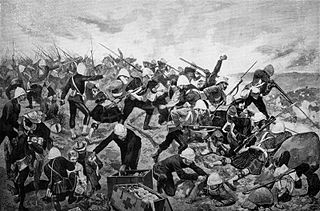
The Battle of Majuba Hill on 27 February 1881 was the final and decisive battle of the First Boer War. It was a resounding victory for the Boers and the battle is considered to have been one of the most humiliating defeats of British arms in history. Maj. Gen. Sir George Pomeroy Colley occupied the summit of the hill on the night of 26–27 February 1881. Colley's motive for occupying Majuba Hill may have been anxiety that the Boers would soon occupy it themselves, Colley having witnessed their trenches being dug in the direction of the hill. The Boers believed that he might have been attempting to outflank their positions at Laing's Nek. The hill was not considered to be scalable by the Boers, for military purposes, and hence it may have been Colley's attempt to emphasise British power and strike fear into the Boer camp.

In Great Britain and former British colonies, a Victorian house generally means any house built during the reign of Queen Victoria (1837–1901). During the Industrial Revolution, successive housing booms resulted in the building of many millions of Victorian houses which are now a defining feature of most British towns and cities.

General Sir Henry Brackenbury, was a British Army officer who was assistant to Garnet Wolseley in the 1870s and became part of his 'Ring' of loyal officers. He also wrote several books of military history and memoirs.
The military history of South Africa chronicles a vast time period and complex events from the dawn of history until the present time. It covers civil wars and wars of aggression and of self-defence both within South Africa and against it. It includes the history of battles fought in the territories of modern South Africa in neighbouring territories, in both world wars and in modern international conflicts.

During the Napoleonic Wars, the Cape Colony was annexed by the British and officially became their colony in 1815. Britain encouraged settlers to the Cape, and in particular, sponsored the 1820 Settlers to farm in the disputed area between the colony and the Xhosa in what is now the Eastern Cape. The changing image of the Cape from Dutch to British excluded the Dutch farmers in the area, the Boers who in the 1820s started their Great Trek to the northern areas of modern South Africa. This period also marked the rise in power of the Zulu under their king Shaka Zulu. Subsequently several conflicts arose between the British, Boers and Zulus, which led to the Zulu defeat and the ultimate Boer defeat in the Second Anglo-Boer War. However, the Treaty of Vereeniging established the framework of South African limited independence as the Union of South Africa.

General Sir Baker Creed Russell was an Australian-born British Army officer who served with distinction in the Indian Mutiny, Anglo-Ashanti War, Anglo-Zulu War and Egyptian War.
Soldiers of the Queen is the quarterly magazine of the Victorian Military Society. It covers many aspects of military and naval history of the Victorian and Edwardian eras, but with a strong emphasis on the armed forces of Great Britain and the British Empire, and the colonial wars of this period. The editor for many years was Roger Stearn, who remains the journal's reviews editor. The editor-in-chief is Andy Smith. The magazine is based in Newbury.

Edwardian architecture is an architectural style popular during the reign of King Edward VII of the United Kingdom. Architecture up to the year 1914 may also be included in this style.

The Kingdom of Zulu, sometimes referred to as the Zulu Empire or the Kingdom of Zululand, was a monarchy in Southern Africa that extended along the coast of the Indian Ocean from the Tugela River in the south to Pongola River in the north.
Byron Edgar Farwell was an American military historian and biographer.

Ethnic, political and social tensions among European colonial powers, indigenous Africans, and English and Dutch settlers led to open conflict in a series of wars and revolts between 1879 and 1915 that would have lasting repercussions on the entire region of southern Africa. Pursuit of commercial empire as well as individual aspirations, especially after the discovery of diamonds (1867) and gold (1886), were key factors driving these developments.
British Library DSC 8327.246000N System no. 00987978 shelf mark P635/100



